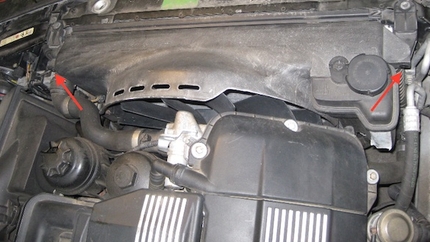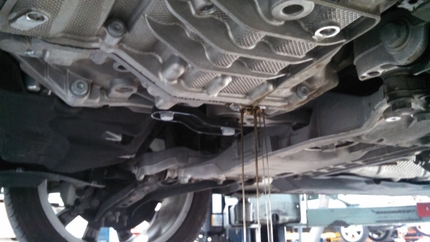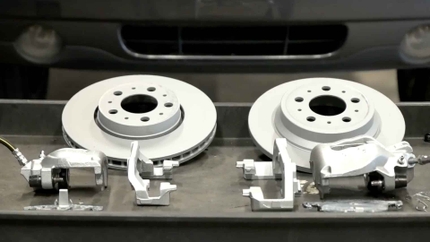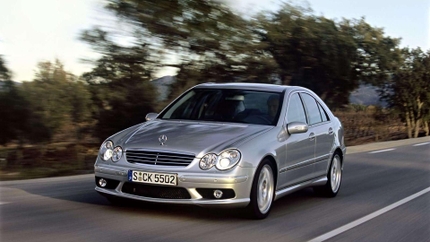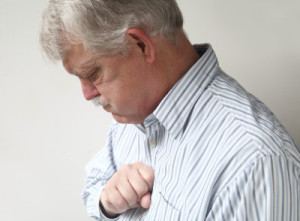 I'm not about to say that a dirty cabin air filter will cause emphysema, or make your children cough and sneeze while you take comfort knowing you saved $20 by ignoring this service. It's not that serious of an item as some companies will lead you to believe, and you don't need to replace it every 7,500 miles. However, pictures tell a thousand words, and in my opinion that's what it really boils down to as far as a cabin air filters are concerned.
I'm not about to say that a dirty cabin air filter will cause emphysema, or make your children cough and sneeze while you take comfort knowing you saved $20 by ignoring this service. It's not that serious of an item as some companies will lead you to believe, and you don't need to replace it every 7,500 miles. However, pictures tell a thousand words, and in my opinion that's what it really boils down to as far as a cabin air filters are concerned.
When a cabin air filter has served out its useful life it becomes clogged with particulates, or develops a hole in which unfiltered particulates can pass through. A clogged filter is just that - a filter that can only pass a small amount of air through its media. This does not mean the filter has failed and is pumping cancer into your vehicle every second the blower motor is on. Ever install a K&N air filter for your engine? The company is proud to state that with time, the media actually filters better when it becomes more saturated with particulates. Granted, lungs require a higher quality of air than an engine does, but filter media with trapped particulates still can function just fine.
When will a filter cause harm?
Cabin air filters can fail, especially if they're exposed to moisture due to a failed drain channel, animals, or humid environments. Anytime an animal has nested above an air filter is an immediate red flag to replace the filter immediately. In most cases, the animal simply dies right on top of the filter. You don't want that stench fouling up your car - and the filter will likely do nothing about the odor, even if it's a charcoal/carbon type. Filters with an obvious hole in them can allow nearly anything into the HVAC system - rats, leaves, dust, etc. That's what you want to prevent.
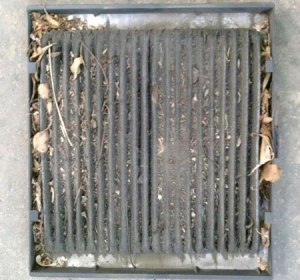 This is still a functioning filter, albeit a very low-flow one at this stage. Replacement should be imminent.
This is still a functioning filter, albeit a very low-flow one at this stage. Replacement should be imminent.
Clogged, full filters aren't quite an immediate hazard to your health, but your blower motor and resistor pack won't be too happy. The more power it takes for the blower to suck air through a clogged filter, the greater chance the motor, or power/stage resistor have of living a shorter life. More importantly, less air will be blown through the vents, resulting in a cold or hot cabin depending on the season. In my opinion, a clean filter is more about making the HVAC system more efficient, not worrying if my (non-existent) children will suffer horrible respiratory illnesses.
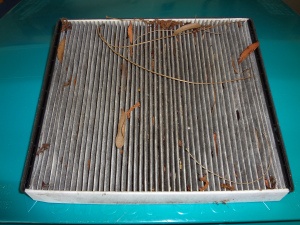 A typical cabin filter after 10-20,000mi. This won't be causing bodily harm to anyone, but it's a great time to replace it to keep other components happy.
A typical cabin filter after 10-20,000mi. This won't be causing bodily harm to anyone, but it's a great time to replace it to keep other components happy.
As always, if a filter is obviously causing a stench in the cabin, replace it no matter how old it is. You don't want mold growing on a moisture-contaminated filter. On some Volvos, the filter is shielded by nothing but the plastic windshield cowling. If this becomes cracked or the drains in the lower cowl become clogged, water can fall directly on to the filter and ruin it in short order. Mold is no joke - but it's not the norm here.
The charcoal upgrade
Some vehicle manufacturers create two cabin filters for the same application - paper and charcoal-infused. The charcoal filters are great for neutralizing outside odors like exhaust, and other inner-city smells. If you've ever smelled New York City, go charcoal, every time. The non-smelling air created by a charcoal filter has even been known to reduce the haunting smell of air conditioner stink - that musty odor that blows through vents when you turn the A/C on for the first time.
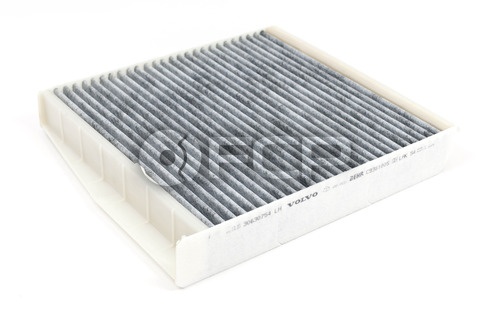 Charcoal P2 Volvo Air Filter - "Charcoal traps odor-causing gases by adsorption (not absorption), and therefore holds the gases on the surface of the charcoal treated media."
Charcoal P2 Volvo Air Filter - "Charcoal traps odor-causing gases by adsorption (not absorption), and therefore holds the gases on the surface of the charcoal treated media."
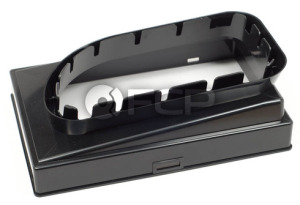 Hey, I drive a Volvo and it doesn't even have a filter!
Hey, I drive a Volvo and it doesn't even have a filter!
You sir, drive an older Volvo 850. Some of these models were shipped without the provisioning for a cabin filter, however you can pop one into the cowl easily with a retrofit kit and a new filter.
In conclusion, I'm of the belief that cabin filters should be changed for the sake of the vehicle's components, not the occupants, except in certain extreme circumstances. Rodents, moisture, and extremely contaminated environments can make a good filter go bad in short order, so use good judgement. Your manufacturer's recommendation is a good guideline to follow, if only used as an interval to check the condition of the filter. My Volkswagen CC specs a filter change every 20K, but some manufacturers go even lower than that. Luckily, the parts are cheap and cabin filters usually aren't too difficult to install.
Charcoal Info Credit: http://www.baldwinfilter.com
Shop Cabin Filter Stuff at FCP Euro
Alex is FCP's Blog Editor and an IT technician from Endwell, NY. He has over 8 years of experience working on a wide array of import makes, but lately is partial to Volvo . For some reason he just purchased a Volkswagen, and is excited to see what breaks first.



